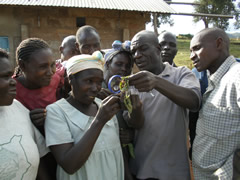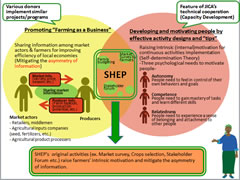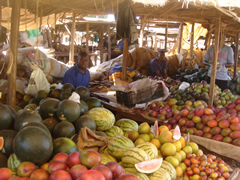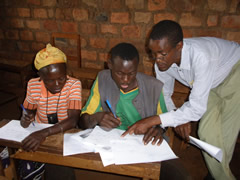The Concept of SHEP is an Economic and Psychology Hybrid. Thinking from the economic theory "grow to sell" and based on a psychological theory "a mechanism for unlocking farmer motivation".
The SHEP approach:History
Horticulture (Vegetables, fruits and cut flowers) is one of the major pillars in Kenya's economy. Approximately 80 % of total production is done by small-scale farmers. However, they are the ones who still suffer from poverty. Based on this background, "Smallholder Horticulture Empowerment Project (SHEP phase 1), a technical cooperation project between Kenyan government and JICA, was launched in 2006. The "SHEP approach" developed in this project greatly contributed to doubling farming income of 2,500 beneficiaries within 2 years. Given such dramatic result, its successor "Smallholder Horticulture Empowerment and Promotion Unit Project (SHEP UP)" is underway to disseminate the approach nationwide in Kenya. Meanwhile, JICA is now promoting its cooperation with the "SHEP approach" for the whole Africa continent and its neighboring regions.

The SHEP approach:Essence
There is a need to create win-win relationships by having farmers and market players share information with one another. There is also a need to establish frameworks that boost motivation among those involved in the project—particularly the farmers themselves. The SHEP approach is unique in that it satisfies both of these requirements. For example, when the farmers carry out market surveys and later crop selection, it not only mitigates the asymmetry of information between farmers and market actors, but also satisfies two key desires: the desire for competence (farmers realize that they were able to conduct a market survey on their own) and the desire for autonomy (farmers get to choose their own crops). In the case of SHEP projects and projects that make use of the SHEP approach, activities that satisfy these two requirements are those that are carried out "intentionally". Motivation is a factor that is taken into consideration not only with SHEP projects, but in technical cooperation as well.

Promoting "Farming as a Business"
Thinking from the economic theory, what is "grow to sell"?
In economics there is a theory referred to as "information asymmetry." Commercial transactions will be carried out efficiently with mutual knowledge of the information of each of the leading actors in market distribution from the producer to the consumer; in other words, by harmonizing information asymmetry. When this is applied to the distribution of agricultural products, trading will be established through matching the information growers have about produced goods, and information on the needs of market actors. This includes knowledge of who is selling or buying, what kind and quality of crops are in demand, when to sell, how many products or how much they want to sell, or whether or not they will buy. Also, speaking from the farmers' point of view, if it is possible to know the needs of market actors in advance, it will be possible to make a cultivation plan that is sure to gain a profit.

Empowering and motivating people by using various "Tips".
Mechanism for unlocking farmer motivation based on a psychological Theory
In psychology there is a theory called "self-determination theory." People possess three intrinsic motivations: autonomy, competence and relatedness. This theory asserts that thinking with your own mind and taking actions by yourself with a feeling of autonomy and competence will increase motivation more than when a person is given remuneration by someone else. In SHEP, when activities are carried out, we pay attention to these three intrinsic motivations and let farmers think voluntarily and tackle challenges by themselves. This results in a sense of accomplishment and competence, providing a feeling of "I can do it on my own." As a result, in each and every person, motivation is naturally unlocked.
If you want to know more about "Mechanism for unlocking farmer motivation based on a psychological Theory", the booklet named "Introduction to the Psychology of International Cooperation" will help.





scroll